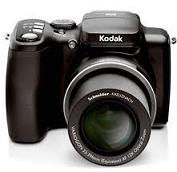Kodak
Judge clears Kodak to place patents on the auction block
 Eastman Kodak Co. received the go-ahead to auction off its valuable trove of digital patents in a contest that will take place behind closed doors and lacks a court-sanctioned lead bidder.
Eastman Kodak Co. received the go-ahead to auction off its valuable trove of digital patents in a contest that will take place behind closed doors and lacks a court-sanctioned lead bidder.
Judge Allan Gropper of the U.S. Bankruptcy Court in Manhattan Monday indicated he would sign off on the rules that will govern bidding for some 1,100 patents, estimated by Kodak to be worth up to $2.6 billion.
The Rochester, N.Y., company in January filed for Chapter 11 after a decadeslong struggle with the emergence of competitors that challenged its iconic film business and the rise of digital technology. The patent sale lies at the heart of its hopes for survival.
Judge Gropper said he was fine with the strong current of confidentiality running through Kodak's proposals for the auction set to begin August 8 and with the fact that the company didn't tap a so-called stalking horse bidder to kick off the fight for the assets.
But he did take issue with a provision that would have limited who was allowed to speak out against the transaction at the final sale hearing, where Judge Gropper will decide whether the deal passes the court's muster. He worried that the company's rules would force him to put on "blinders" and ignore possible complaints from bidders or others about the auction process.
The bidding procedures "as far as I see it, go far beyond any procedures I've ever seen in a bankruptcy case with regard to the power and authority they give to the debtors to do whatever the debtors want so long as the committees agree," Judge Gropper said. Kodak has given several parties, including its official committee of unsecured creditors, "reviewing creditor" status, meaning the company needs their consent to proceed with a winning bid.
Andrew D. Dietderich, a Sullivan & Cromwell LLP attorney representing Kodak, argued that a deal that both the company and its reviewing creditors consider to be in Kodak's best interests should carry much weight with the court. He ultimately agreed to scale back the objection restrictions but stressed that the sale rules should send a message that the auction was the end of the line.
"It's important that the auction be final," he said. "We need to be able to send a firm message that it's over."
Protests about the sale process came from various Kodak license holders, including big-name technology companies like Intel Corp.,Canon Inc. and Nikon Corp. Those businesses resolved the majority of their qualms before the hearing got under way, as did a group of retirees who had complained they weren't being given a powerful enough voice in the sale process.
The biggest remaining hurdle is Apple Inc., which is battling Kodak for ownership of 13 patents that Kodak wants to include in the sale. Apple, also a possible buyer of Kodak assets, expressed concerns that the industry's "patent trolls" could use the patents to squeeze money from manufacturers. Paul Basta, a Kirkland & Ellis attorney representing Apple, was also critical of the objection provision that caught Judge Gropper's eye, saying his client might find itself powerless to speak out in opposition to a deal that affects its rights.
"We've been limited now with respect to things that we don't yet know about," Mr. Basta said.
The sale process puts two groups of patents up for grabs; the first includes more than 700 patents covering technology used in digital cameras, smartphones and tablet computers to capture, process and transmit images. The second group has more than 400 patents for technology used to analyze, manipulate, store and access images. Both portfolios include foreign patents as well as pending U.S. and foreign patent applications.
According to Kodak, it has been able to earn more than $3 billion from licensing the patents over the past decade.
(Published by WSJ - July 3, 2012)